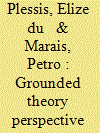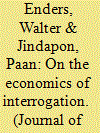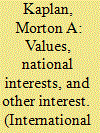| Srl | Item |
| 1 |
ID:
153655


|
|
|
|
|
| Summary/Abstract |
The methodology of grounded theory has great potential to contribute to our understanding of leadership within particular substantive contexts. Leadership is a global phenomenon, but appears to have a variety of attributes and seems to elude clear definition. In this research we argue that such variation is contextually derived. Leadership is not only a socially influenced process but also a relation-influenced process that occurs within a social system. The focus in this paper is on the challenges facing leaders engaged in multicultural education. In general, grounded theorists seek to develop theory inductively from systematically gathered and analysed data. An integrative picture or story is developed from this process. In the present instance we explore how conducting grounded theory research according to a qualitative approach accentuates the need to understand and explain contextualised leadership. We conclude by suggesting how leaders might overcome challenges in multicultural education.
|
|
|
|
|
|
|
|
|
|
|
|
|
|
|
|
| 2 |
ID:
106022


|
|
|
|
|
| Publication |
2011.
|
| Summary/Abstract |
While military protocol requires that POWs provide only name, rank, serial number, and date of birth (the so-called Big 4), it is naive to think that all detainees, including terrorists, behave in this fashion. Instead, there is evidence that detainees partially cooperate with their captors by revealing a limited amount of valuable information during the interrogation process. Such a strategy makes it appear that the detainee is cooperative and, since interrogations can be costly, serves as a disincentive for further interrogation. In order to capture the essential differences between the two strategies, we model two different types of games between the interrogator and the detainee. Specifically, we compare the Big 4 game to a two-stage game (the Little Fish game) in which the detainee is permitted to reveal low-level information to the interrogator. We formalize both games, derive the optimal rules for each player, and show that the Big 4 game may not be optimal for either player or for the overall well-being of the interrogating nation. As such, the Little Fish game can Pareto-dominate the Big 4 game. Hence, it is possible that the al-Qaeda strategy of partial cooperation is superior to that used by most standing armies. We also show that the level of intensity selected by the interrogator must be balanced by such factors as the moral values of the society and recruiting potential of the terrorists versus the likelihood of obtaining important information.
|
|
|
|
|
|
|
|
|
|
|
|
|
|
|
|
| 3 |
ID:
118331


|
|
|
|
|
| Publication |
2013.
|
| Summary/Abstract |
The erosion in moral values in the armed forces over the past few decades has left India's political and military leadership bewildered and befuddled. No amount of preventive or curative measures appear to be succeeding in arresting this fall, as day after day dawns with news of fresh instances of impropriety and indecorum. This article attempts to examine the issues of morals and ethics as relevant to the profession of soldiering across the time continuum. It dwells further on the probable causes of the erosion of moral values and ethics in the Army. The article suggests certain fundamental approaches towards addressing this complex human issue albeit with immense prudence, as 'sometimes the remedy is more lethal than the disease'.
|
|
|
|
|
|
|
|
|
|
|
|
|
|
|
|
| 4 |
ID:
131017


|
|
|
|
|
| Publication |
2014.
|
| Summary/Abstract |
This article examines the concept of "national interest," from its common use in policy circles to the network of subordinate and superordinate interests in which a state is situated. When analyzing the interest of a social system, like a state, it is important to take into account the level of governance and the interests of the individuals and subsystems upon which the system depends, and consider the value of serving other members in federations, alliances, and blocs even at sacri?ce to itself. A systems approach to politics enables tl1e international relations professional to transcend the problems often encountered by the subjective use of raw power for perceived national interests that fail to accurately anticipate unintended consequences.
|
|
|
|
|
|
|
|
|
|
|
|
|
|
|
|